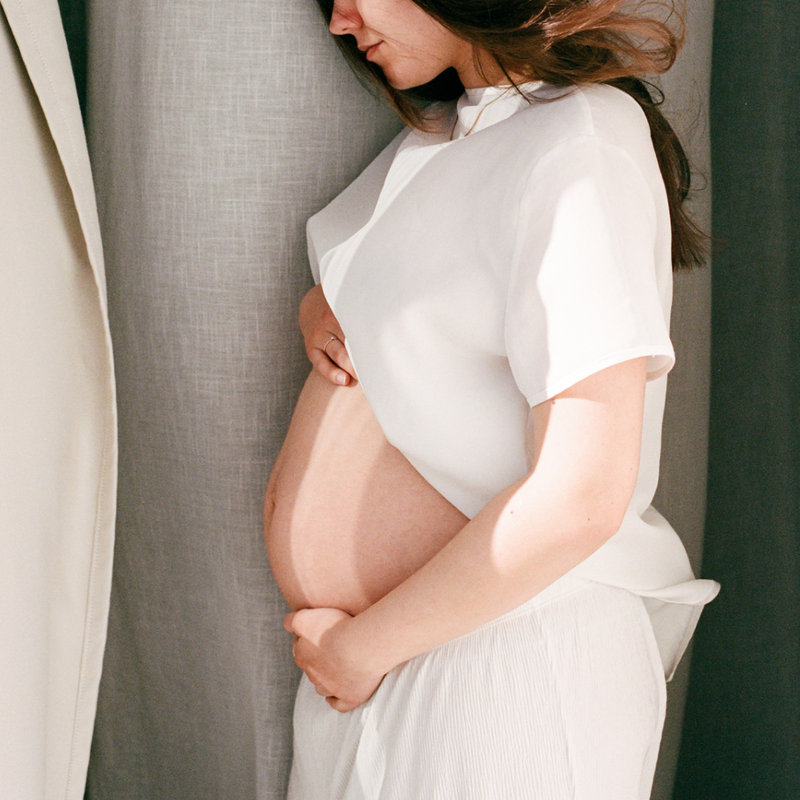The old adage that “you should sleep now, because it’ll be that much tougher when the baby comes?” A nice thought, maybe—but not exactly conducive to reality. In fact, 78 percent of women report more restless sleep throughout their pregnancy. (And as you can imagine, sleep problems tend to climb the charts as you move into the third trimester and beyond.)
The hitch, of course, is that good sleep, or lack thereof, affects our immunity, our energy, and our ability to function at our best—and when it comes to pregnancy, a time when our bodies are working especially hard, it is no wonder that sleep is vitally important. During pregnancy, doctors recommend trying to clock eight to 10 hours of sleep per night.1,2
First Trimester
You might not have a big bump to contend with in early pregnancy—but the swirl of first trimester hormones can certainly impact your ability to get restful sleep. If you’re dealing with morning sickness, that nausea can present challenges, too. On the flip side, baby’s early development can make us feel exhausted all the time during those initial weeks of pregnancy, so you might feel the urge to nap throughout the day.
Second Trimester
As your baby bump continues to grow in the second trimester, you might start to find it more challenging to find a comfortable sleep position. Some women also report experiencing nighttime leg cramps starting during this phase of pregnancy. (We’ll get to a solve for that shortly.)
Third Trimester
Predictably, this is the time of pregnancy that starts to get a bit uncomfortable—especially when you’re lying in bed at night. (Hello, back pain.) If you typically sleep on your back or stomach, you’ll need to get used to sleeping on your left side—experts say that this is the best way to optimize blood flow for your growing baby. (And it’s probably more comfortable, too.)

How to get better sleep during pregnancy
#1: Find a comfortable sleeping position
As a pregnant woman’s body shifts, your typical sleeping position may have to change as well. Again, as you move into the third trimester, it’s generally recommended to sleep on your left side to increase the blood flow to your baby. However, it’s still important to sleep comfortably so you don’t end up with aches and pains. Pregnancy pillows can help with that.
“There is no one-size-fits-all approach to finding your best sleeping position, and you may need to shift throughout your pregnancy, but I suggest starting to sleep with a long body pillow behind you, in front of you, and of course under your head,” says Dr. Allison Oswald, board-certified doctor of women’s health physical therapy (and Perelel panelist). “The pillow in front goes in between your arms and your bent legs. And the pillow behind you will support your spine and allow you to roll back slightly so you don’t have to be directly on your hip. This position aligns the body and decreases strain on the pelvis to keep your core in a lengthened position so the baby has plenty of space.”
Bonus—use your body pillows postpartum as a barrier to protect your baby from sharp corners.
#2: Rethink your bedtime routine.
We do it for our babies, but creating a bedtime routine is incredibly beneficial for us as well. “Pregnant or not, winding down before bed creates and maintains a rhythm to promote a good night’s sleep,” says Dr. Oswald. Here are some ways to destress from a long day and get your body into a state of relaxation before bedtime.
-
Limit your screen time at least one hour before bedtime. Phones, TVs, or laptops all contain blue light, which interferes with your body's natural sleep cycle because it blocks the hormone melatonin that makes you sleepy.
-
Charge your cell phone away from your bed so you’re not tempted to scroll in the middle of the night.
-
Start your bedtime routine at the same time each night to get your body in a habit of falling (and staying) asleep.
-
Keep a pad of paper next to your bed to capture those late-night thoughts and to-dos.
-
Use an alarm clock instead of your phone.
-
Put a glass of water on your nightstand to avoid any middle of the night trips to the kitchen.
-
If you wake up to use the bathroom, don’t look at the clock. This avoids any anticipation of when you need to be up and what you have to do the next day.
#3: Take a breath.
"Breathwork is a wonderful way to quiet the nervous system and tap into the parasympathetic nervous system, which is known as our rest and digest system," says Dr. Oswald. "A simple practice of taking slow, deep breaths while sitting at the edge of your bed or while lying down will help prepare your body for sleep."3
A Bedtime Breathwork Practice
Sit with your feet on the floor or lying down. Breathe in through your nose for four seconds. Your ribcage should expand 360 degrees, not up into your shoulders and neck. The belly will also expand slightly. To help visualize this, imagine breathing into the baby. Hold your breath for seven seconds. Then, exhale through your mouth for eight seconds. The ribcage will recoil and the belly will pull in gently. Breathe like this for a few minutes and with each exhale imagine that you're sinking further down into the earth, feeling a heaviness that surrounds the entire body.
#4: Forget white noise—try pink noise.
You may have heard of white noise for drowning out external sounds. But its lesser known cousin has actually been associated with deeper sleep. "Pink noise refers to audio with lower frequencies, which has shown to be more relaxing to our ear than other higher frequencies. Into it? Us, too. Try our pink noise playlist to sleep like a baby tonight.
#5: Take a nap.
Napping doesn’t just help you supplement your nighttime sleep sessions—research suggests that taking naps throughout pregnancy can actually lead to healthy outcomes for baby. One caveat: Lying down directly after eating can contribute to heartburn, so you’ll want to wait a little bit after a meal.4
#6: Try a pregnancy-safe sleep aid.
Sometimes we need a little additional help to get quality rest—but a lot of sleep aids aren’t necessarily safe for pregnancy, including melatonin. (There's limited research around melatonin's affect on babies.) That’s why our doctors specifically created our Sleep Support with pregnancy (and breastfeeding!) in mind: It contains magnesium, which functions as a precursor for your body’s natural relaxation response. (In other words, it helps your body do what it does best.) FWIW, magnesium can help with those second trimester leg cramps, too.
$32.95
$49.95
$49.95
Shop the Article:

Sleep Support*
/ Month
Shop Now

2nd Trimester Prenatal Pack
/ Month
Shop Now

3rd Trimester Prenatal Pack
/ Month
Shop Now
Our proprietary Magnesium Tri-Blend is backed by research and formulated with three types of bioavailable magnesium plus added organic lemon balm. Ready to sleep like a baby?
Read Next: Do this one thing each morning for a better night's sleep.

theFolio in Your Inbox
Sign up to receive doctor-backed, stage-specific content in your inbox each week.
Resources:
- Sedov ID, Cameron EE, Madigan S, Tomfohr-Madsen LM. Sleep quality during pregnancy: A meta-analysis. Sleep Med Rev. 2018 Apr;38:168-176. doi: 10.1016/j.smrv.2017.06.005. Epub 2017 Jun 15. PMID: 28866020.
- Song L, Shen L, Li H, Liu B, Zheng X, Zhang L, Xu S, Wang Y. Afternoon napping during pregnancy and low birth weight: the Healthy Baby Cohort study. Sleep Med. 2018 Aug;48:35-41. doi: 10.1016/j.sleep.2018.03.029. Epub 2018 Apr 27. PMID: 29857289.
- Silvani MI, Werder R, Perret C. The influence of blue light on sleep, performance and wellbeing in young adults: A systematic review. Front Physiol. 2022 Aug 16;13:943108. doi: 10.3389/fphys.2022.943108. PMID: 36051910; PMCID: PMC9424753.
- Russo MA, Santarelli DM, O'Rourke D. The physiological effects of slow breathing in the healthy human. Breathe (Sheff). 2017 Dec;13(4):298-309. doi: 10.1183/20734735.009817. PMID: 29209423; PMCID: PMC5709795.
This article is for informational purposes only. It is not, nor is it intended to be, a substitute for professional medical advice, diagnosis, or treatment and we recommend that you always consult with your healthcare provider. To the extent that this article features the advice of physicians or medical practitioners, the views expressed are the views of the cited expert and do not necessarily represent the views of Perelel.






















